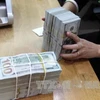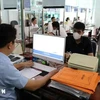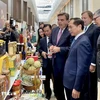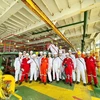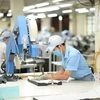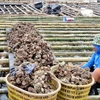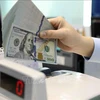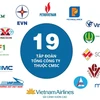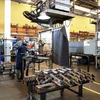Vietnam’s business confidence index (BCI) in the second quarter increased 31 points over the first quarter, reaching 130 points, according to a recent survey.
The survey was conducted by the Vietnam World Vest Base Financial Intelligence Services (WVB FISL) and the PetroVietnam Finance Investment and Consultancy Company (PVFC Invest), who surveyed 192 companies in 11 key industries from June 11 through the first week of July.
The result signaled recovery and positive growth for Vietnam’s economy in the near future.
When asked about the country’s economy, 53 per cent of those interviewed said the overall economic conditions had improved compared to 12 months ago and 75 per cent believed overall economic conditions would be better over the next 12 months.
As many as 59 per cent expected to increase worker hire in the next 12 months and 60 per cent thought their companies would invest more in fixed assets over the next 12 months.
In the survey, most CEOs, managing directors and business managers also expressed the great confidence they had in their companies’ revenues and profits for the next 12 months. Up to 81 per cent gave higher sales projections while 72 per cent expected their profits would increase.
All respondents also indicated they trusted the Government’s key measures to boost consumer demand, including reduction of consumer and corporate loan interest rates, and wide dissemination of information about consumer demand stimulus policies.
However, 51 per cent of the interviewees said that interest rates on consumer loans from banks should be between 5 and 8 per cent to help stimulate domestic consumer demand.
A total of 48 per cent of respondents were worried about the depreciation of the Vietnamese dong against the US dollar, and forecast that the rate between the two currencies would be more than 18,000 VND per USD by the end of 2009.
When asked to make a forecast about the inflation rate over the next 12 months, 42 per cent said they believed the inflation rate would be between 5 and 10 per cent. Thirty per cent put it between 10 and 15 per cent, only 9 per cent pulled it down to below 5 per cent, while 6 per cent said it would be between 15 to 20 per cent./.
The survey was conducted by the Vietnam World Vest Base Financial Intelligence Services (WVB FISL) and the PetroVietnam Finance Investment and Consultancy Company (PVFC Invest), who surveyed 192 companies in 11 key industries from June 11 through the first week of July.
The result signaled recovery and positive growth for Vietnam’s economy in the near future.
When asked about the country’s economy, 53 per cent of those interviewed said the overall economic conditions had improved compared to 12 months ago and 75 per cent believed overall economic conditions would be better over the next 12 months.
As many as 59 per cent expected to increase worker hire in the next 12 months and 60 per cent thought their companies would invest more in fixed assets over the next 12 months.
In the survey, most CEOs, managing directors and business managers also expressed the great confidence they had in their companies’ revenues and profits for the next 12 months. Up to 81 per cent gave higher sales projections while 72 per cent expected their profits would increase.
All respondents also indicated they trusted the Government’s key measures to boost consumer demand, including reduction of consumer and corporate loan interest rates, and wide dissemination of information about consumer demand stimulus policies.
However, 51 per cent of the interviewees said that interest rates on consumer loans from banks should be between 5 and 8 per cent to help stimulate domestic consumer demand.
A total of 48 per cent of respondents were worried about the depreciation of the Vietnamese dong against the US dollar, and forecast that the rate between the two currencies would be more than 18,000 VND per USD by the end of 2009.
When asked to make a forecast about the inflation rate over the next 12 months, 42 per cent said they believed the inflation rate would be between 5 and 10 per cent. Thirty per cent put it between 10 and 15 per cent, only 9 per cent pulled it down to below 5 per cent, while 6 per cent said it would be between 15 to 20 per cent./.

